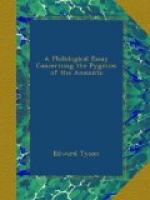PREFATORY NOTE
It is only necessary for me to state here, what I have mentioned in the Introduction, that my account of the habits of the Pigmy races of legend and myth makes no pretence of being in any sense a complete or exhaustive account of the literature of this subject. I have contented myself with bringing forward such tales as seemed of value for the purpose of establishing the points upon which I desire to lay emphasis.
I have elsewhere expressed my obligations to M. De Quatrefage’s book on Pigmies, obligations which will be at once recognised by those familiar with that monograph. To his observations I have endeavoured to add such other published facts as I have been able to gather in relation to these peoples.
I have to thank Professors Sir William Turner, Haddon, Schlegel, Brinton, and Topinard for their kindness in supplying me with information in response to my inquiries on several points.
Finally, I have to acknowledge my indebtedness to Professor Alexander Macalister, President of the Anthropological Institute, and to Mr. E. Sidney Hartland, for their kindness in reading through, the former the first two sections, and the latter the last two sections of the Introduction, and for the valuable suggestions which both have made. These gentlemen have laid me under obligations which I can acknowledge, but cannot repay.
Bertram C. A. Windle.
Mason College,
Birmingham, 1894.
INTRODUCTION
I.
Edward Tyson, the author of the Essay with which this book is concerned, was, on the authority of Monk’s Roll of the Royal College of Physicians, born, according to some accounts, at Bristol, according to others, at Clevedon, co. Somerset, but was descended from a family which had long settled in Cumberland. He was educated at Magdalene Hall, Oxford, as a member of which he proceeded Bachelor of Arts on the 8th of February 1670, and Master of Arts on the 4th of November 1673. His degree of Doctor of Medicine he took at Cambridge in 1678 as a member of Corpus Christi College. Dr. Tyson was admitted a candidate of the College of Physicians on the 30th of September 1680, and a Fellow in April 1683. He was Censor of the College in 1694, and held the appointments of Physician to the Hospitals of Bridewell and Bethlem, and of Anatomical Reader at Surgeons’ Hall. He was a Fellow of the Royal Society, and contributed several papers to the “Philosophical Transactions.” Besides a number of anatomical works, he published in 1699 “A Philosophical Essay concerning the Rhymes of the Ancients,” and in the same year the work by which his name is still known, in which the Philological Essay which is here reprinted finds a place. Tyson died on the 1st of August 1708, in the fifty-eighth year of his age, and is buried at St. Dionis Backchurch. He was the original of the Carus not very flatteringly described in Garth’s “Dispensary.”




